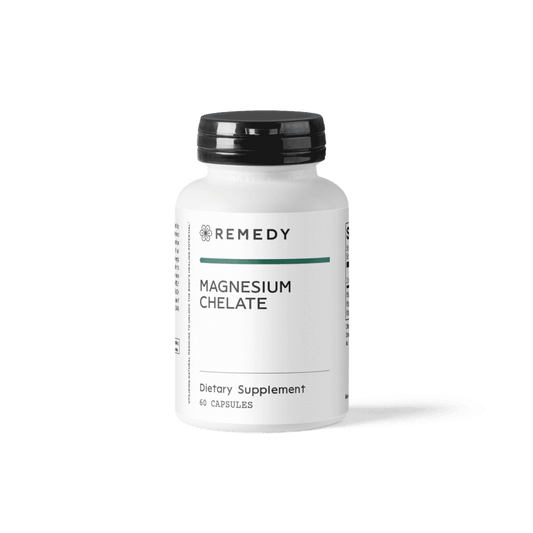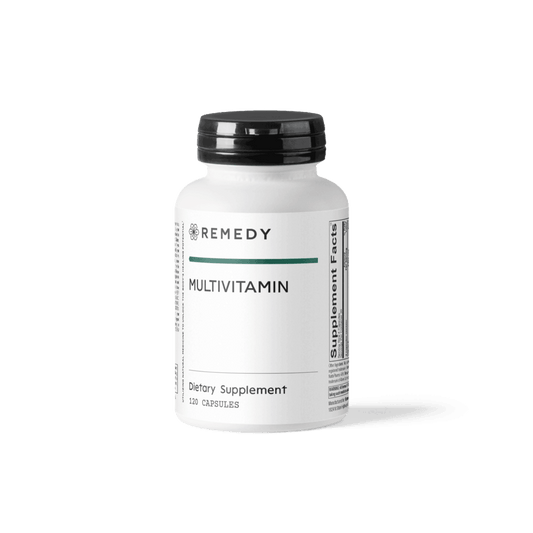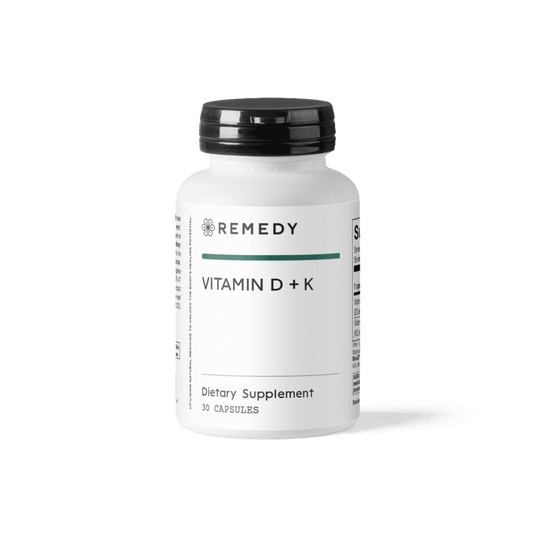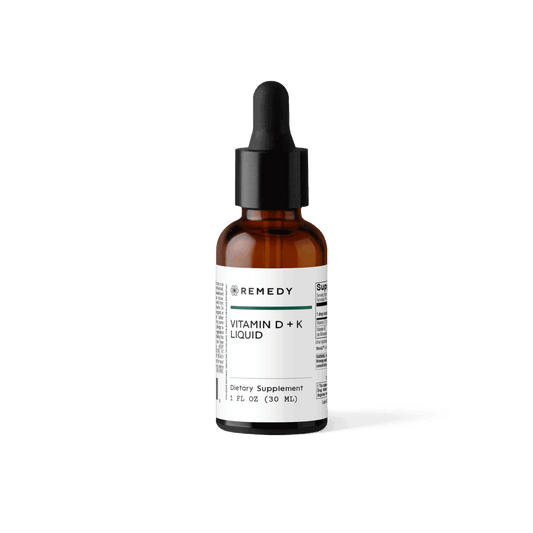Share
Poor soil health leads to less nutrient dense food, making supplementation necessary in most cases.
Magnesium Deficiency is possibly one of the most common nutrient deficiencies in the United States. Nearly half of the population is not getting enough magnesium from their diet. You would think that as a wealthy, health-conscious nation nutrient deficiencies would be a thing of the past. Unfortunately, the standard American diet and modern farming practices have led to widespread magnesium deficiency.
Magnesium is one of the essential minerals for your body. It’s the fourth most abundant charged mineral (cation) in the body and is a cofactor in more than 300 enzymatic reactions. Basically, this means magnesium is necessary for biochemical processes like energy metabolism, protein synthesis, muscle and nerve function, blood glucose, and blood pressure control.
In this comprehensive guide to magnesium deficiency, you’ll learn why magnesium is essential for your body, how to identify a magnesium deficiency, and what to do if you are deficient.
What Does Magnesium do for Your Body?
Like calcium and iron, some of the more well-known minerals, magnesium is critical for the proper functioning of your body. It’s involved in a majority of the body’s metabolic reactions. Not to mention, one of its more important roles is in energy production in the body.
Magnesium forms the foundation for good health. Here are a few of the roles magnesium plays in your body:
- Maintains electrolyte balance.
- Contributes to cellular energy production.
- Relaxes muscles.
- Reduces oxidative stress.
- Improves bone density.
- Reduces tiredness and fatigue.
- Supports normal protein synthesis.
- Enhances mental performance and mood.
- Regulates blood pressure
- Stabilizes heart rhythm.
Interestingly, magnesium also provides health benefits to your brain. It supports a number of neurotransmitter systems and acts as sort of a brake on your nervous system. In other words, magnesium helps keep you from feeling hyperactive or anxious during normal daily activities. Research also suggests that it may shield brain cells from biological stress and cognitive decline.
Causes of Magnesium Deficiency
There are three main causes of magnesium deficiency. These include a low magnesium diet, poor magnesium absorption, and rapid magnesium depletion. Chronic disease, use of medications, low magnesium in food crops, and overconsumption of refined and processed foods all contribute to these three factors. Here’s a bit more information on each factor.
Low Magnesium Diet
Magnesium is a mineral which means it originates in the soil, rocks, and water. Normally, you should get enough magnesium in your diet simply by eating food that is grown in soil with plenty of magnesium and drinking water with plenty of magnesium.
Sadly, the way crops are cultivated today results in far less magnesium than even 100 years ago. Modern, industrial agriculture strips water-soluble minerals from the soil and that magnesium is rarely replaced. Low magnesium in the soil affects every type of food you eat, including meat and dairy, because animals also now feed on low-magnesium crops.
Simply put, soil health impacts food nutrient density. If our soil is of poor quality, so are the nutrients in our food.
Magnesium is also lost during food processing so any of the processed foods you eat are low in magnesium.
Poor Magnesium Absorption
Magnesium is primarily absorbed in the small intestine and is dependent on the amount ingested. However, if your gut is compromised then you won’t properly absorb many nutrients, including magnesium. GI disorders like Crohn’s disease, celiac disease, Irritable Bowel (IBS) Syndrome, intestinal inflammation, and Small Intestinal Bacterial Overgrowth (SIBO) can lead to magnesium deficiency.
Rapid Magnesium Depletion
Sometimes you become magnesium deficient due to other reasons than diet or absorption. Disease, medications, stress, alcohol, intensive exercise, and caffeine can lead to “magnesium wasting” or more rapid depletion of magnesium.
Common prescription medications that are known to deplete magnesium include insulin, certain blood pressure medications (thiazide and loop diuretics), proton pump inhibitors (omeprazole, pantoprazole), and others.
Stress on the body, whether good stress (exercise) or bad stress, causes an increased need for magnesium to counter the effects of stress. When you are under chronic stress your body uses more magnesium, and this often leads to a magnesium deficiency.
Symptoms of Magnesium Deficiency
How do you know if you are deficient in magnesium? Because it is involved in so many different processes a lot of the symptoms are generally non-specific. This often causes magnesium deficiency to be overlooked. However, there are a few symptoms you can look out for.
- Anxiety
- Confusion
- Cramps
- Disorientation
- Irritability
- Muscular weakness
- Pain or hyperalgesia
- Involuntary muscle spasms
- Tremors
- Insomnia
- Vitamin D resistance
- Calcium deficiency
- Potassium deficiency
Health Risks of Magnesium Deficiency
Over time, magnesium deficiency can increase the risk of more serious health conditions.
For example, you may be more prone to osteopenia or bone fractures. This is because your body will draw magnesium from the skeleton into the bloodstream if not enough is absorbed through the gut. A magnesium deficiency also increases your risk of type 2 diabetes, high blood pressure, depressive disorders, and anxiety disorders.
In addition, subclinical magnesium deficiency increases the risk of numerous types of cardiovascular disease.
How to Test Magnesium Levels?
It is difficult to diagnose a magnesium deficiency because blood testing, or serum testing, is not very useful. Magnesium is mostly stored in your bones and organs. In fact, blood levels account for less than 1% of total magnesium levels. This means that even if your blood levels of magnesium are in the normal range, you may still be magnesium deficient and suffer from related symptoms.
When blood testing is used and a magnesium deficiency is apparent it indicates a profound deficiency known as hypomagnesemia.
Most people have a subclinical magnesium deficiency which means they may never be diagnosed but are still at risk.
Here are a few questions to ask yourself that might indicate a magnesium deficiency:
- Do I have some of the symptoms related to magnesium deficiency?
- How much magnesium am I consuming through my diet?
- Am I taking any medications that could interfere with magnesium absorption?
- Am I under significant stress that could result in a magnesium deficiency?
How to Treat Magnesium Deficiency?
Treating magnesium deficiency is as simple as increasing your intake. Adding more magnesium to your diet through healthy plant and animal food choices is a great place to start. Good sources of magnesium include seeds, nuts, green leafy vegetables, legumes, and whole grains.
The fact of the matter is you will probably need to include a magnesium supplement into your daily routine, too. Modern life lends itself to a magnesium deficiency. Consumption of caffeine and alcohol, stress, medications, and even just excess sweating make it hard to get enough magnesium through food alone.
Not all magnesium supplements are created equal, make sure you are choosing a high quality and trusted brand as well as a highly absorbable form. Magnesium supplements are commonly divided into salt forms (oxide, sulfate, and citrate) and chelated forms (glycinate, malate, threonate). The salt forms break down easily in the body but are not well absorbed. The chelated forms are magnesium bound to proteins (chelates) and increase the amount absorbed in the small intestine leading to overall better availability and absorption.
Not only are magnesium forms absorbed differently, but can also serve different purposes based on the needs of the individual.
- Magnesium Glycinate is well absorbed and a great choice for repleting magnesium systemically. Magnesium glycinate also has the least amount of GI distress, making it a great option for people who tend to have loose stools or GI distress.
- Magnesium Malate is a highly absorbable form of magnesium and can help to promote energy generation in the cell, making magnesium malate an excellent choice for conditions like fibromyalgia and chronic fatigue.
- Magnesium Threonate crosses the blood-brain barrier making it a good choice when you want support for anxiety, depression, and headaches.
- Magnesium Citrate is highly absorbed, however, can cause GI distress (loose stools). This “side effect” can be used as an advantage for those suffering bowel irregularity or constipation.
If you think you have a magnesium deficiency you may want to work with a functional medicine practitioner. Due to the fact that blood testing is not as effective at identifying subclinical magnesium deficiency, you’ll likely want more advanced nutrient testing. A functional medicine practitioner will also help you navigate the many available magnesium supplements on the market and address any other health conditions that may impact absorption.
If you’re interested in learning more about how a functional medicine practitioner can help address your magnesium deficiency, reach out to me and let’s schedule a 15-minute consultation!













